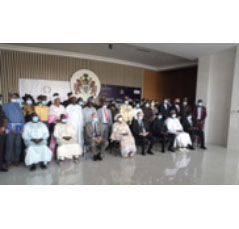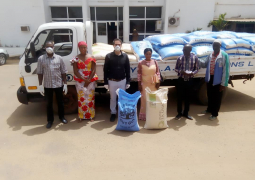
“These are all efforts to show that the government of President Barrow is committed to Security Sector Reform (SSR).”
VP Touray was speaking recently during the launching of an Immigration Project. The project is aimed at strengthening the efficiency and accountability of the Gambia Immigration Department (GID). The launching ceremony was held at the Sir Dawda Kairaba Jawara International Conference Centre. The project was funded by the Swiss government and implemented by Geneva Centre for Security Sector Governance (DCAF).
VP Touray said: “In the aftermath of The Gambia’s December 2016 presidential election and assumption of the presidency by Adama Barrow, there was a clear need for a new people-centered national security policy to address Gambia’s glaring security deficit.”
“There was a rising popular expectation for a streamlined, cohesive, participatory, civilian-controlled and transparent National Security Policy (NSP), for the “New Gambia,” predicated on human-security and this became a reality under Barrow’s government.”
For the first time in the history of The Gambia since independence in 1965, she said, there is a NSP which spells out key roles, responsibilities, and mandates of vital security institutions, organs, agencies, and personnel in order to reconfigure the security sector to meet evolving national state and human-security needs, challenges, risks and opportunities well into the next decade of the twenty-first century.
“The Gambia’s new NSP will avail itself to periodic review and evaluation to reflect changing national, regional and global dynamics. Resulting institutionalised checks and balances to strengthen various security service responsiveness, will make for a cohesive policy-strategy which at its core is driven by Security Sector Reform (SSR) principles in pursuit of human and national security.”
“There has been some tremendous progress or successes registered in the SSR, key amongst them is the review of the SIS Act, GPF ACT, GAF Act and very soon the GID Act and all this is possible thanks to the support of DCAF.”
Retired Col. Momodou Badjie, said DCAF has been around and supporting the country since the beginning of the country’s security sector reforms in 2017.
DECAF, Badjie added, was successful in implementing a project in supporting The Gambia government in its efforts to launch a very inclusive security sector reforms process with a view to strengthening the civilian management in oversight of the security sector reforms process.
Seedy Touray, director general of The Gambia Immigration Department (GID), said: “This important programme is a breakthrough between the DECAF and the GID. We are gathered here today to witness the DECAF project to support the GID on key components among which is policy regulations, internal oversight and leadership and management development,” he said, adding that his department is fully committed to this programme.
He maintained that the GID is in compliance with the SSR process and implementation of the country’s National Development Plans. “We have developed and aligned our ten goals reforms agenda into our five years strategic plan 2019 to 2024 which again encompasses key areas identified by the DECAF.”
For his part, Vincenzo Mascioli, director for International Affairs, State Secretariat for Migration, Switzerland, said: “Three principles are essential to our operation: trust, reliability and the spirit of partnership. What do we mean by partnership? Partnership to us does not mean that we are not here to quickly solve your problems and then leave again, no. Partnership to us means we look at our cooperation from a long-term perspective.”
“It is in that sense, Switzerland might be able to support The Gambian path of a young democracy by supporting you in terms of building and developing your instructions. That’s why Switzerland is here today launching this important project being implemented by DCAF,” he said, adding that the perspective to the young people is key to any development.
“We are about to launch another important project where young Gambians in the tourism sector will be given an opportunity to be trained in a high quality institution in Nairobi. Furthermore, we are about to start another project of reintegration.”
Read Other Articles In Headlines




